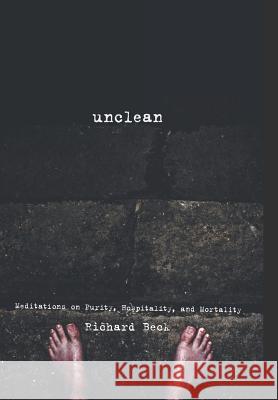Unclean » książka
Unclean
ISBN-13: 9781498212403 / Angielski / Twarda / 2011 / 212 str.
Unclean
ISBN-13: 9781498212403 / Angielski / Twarda / 2011 / 212 str.
(netto: 162,45 VAT: 5%)
Najniższa cena z 30 dni: 168,68
ok. 16-18 dni roboczych.
Darmowa dostawa!
Description: "I desire mercy, not sacrifice." Echoing Hosea, Jesus defends his embrace of the "unclean" in the Gospel of Matthew, seeming to privilege the prophetic call to justice over the Levitical pursuit of purity. And yet, as missional faith communities are well aware, the tensions and conflicts between holiness and mercy are not so easily resolved. At every turn, it seems that the psychological pull of purity and holiness tempts the church into practices of social exclusion and a Gnostic flight from "the world" into a "too spiritual" spirituality. Moreover, the psychology of purity often lures the church into what psychologists call "The Macbeth Effect," the psychological trap that tempts us into believing that ritual acts of cleansing can replace moral and missional engagement. Finally, time after time, wherever we see churches regulating their common life with the idiom of dirt, disgust, and defilement, we find a predictable wake of dysfunction: ruined self-images, social stigma, and communal conflict. In an unprecedented fusion of psychological science and theological scholarship, Richard Beck describes the pernicious (and largely unnoticed) effects of the psychology of purity upon the life and mission of the church. Endorsements: "Theologians write endlessly about how Christian faith should affect our morality, our philosophy, and our spirituality. Richard Beck is the only one I know who asks what it has to do with what turns our stomachs. He writes bluntly and stunningly about the engagement of grace with our visceral dynamics of disgust and avoidance. Our complex, precognitive repulsions toward groups, behaviors, and persons stem from deep patterns in our nature. But, unredeemed, those patterns also block us from the gospel path. Beck combines biblical interpretation, theological wisdom, and dramatic psychological insights to give an earthy and exciting take on the Christian life." --S. Mark Heim Samuel Abbot Professor of Christian Theology Andover Newton Theological School "In his thoughtful, engaging, and even sometimes humorous style, Richard Beck tells the church that it is time to get dirty. With one leg hip-deep in theology and the other in psychological science, Beck persuasively argues that the church's obsession with purity is a costly pursuit, one fraught with serious psychological and sociological consequences. You may not always agree, but you will be challenged in new ways to think about the church's mission." --Peter C. Hill Editor, Journal of Psychology and Christianity "Richard Beck has my vote as the liveliest voice in the contemporary integration of psychology and theology. In Unclean, he weaves together his sophisticated grasp of psychological research and theological reflection in a manner that is both prophetic and inviting. This is one of those rare books that can be helpful to those who love the church and also to those who have been hurt by churches. Beck writes with an integrative and formative rhythm that kept stimulating my mind and pulling at my heart. These ancient Biblical concepts of mercy, holiness, and hospitality have been implanted anew with deeper meaning for me." --Steven J. Sandage Professor of Marriage and Family Studies Bethel University "I am thankful that this insightful and important work has come to print. Richard Beck has woven together important themes from various critical conversations--psychology, theology, biblical studies, and missional ecclesiology--with exceptional artistry. He has ventured across the purity boundaries of academic disciplines for the sake of a large picture of the hospitality of God. His readers will be well rewarded for welcoming this ambitious and immensely practical book." -- Mark Love Director, Resource Center for Missional Leadership Rochester College "Richard Beck's insightful book is a must-read for those who want to embody Christ's love in the world. Moving beyond mere sentimentality, this book exposes why we are so prone"











